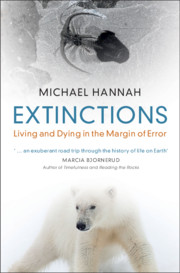Book contents
- Extinctions
- Reviews
- Extinctions
- Copyright page
- Epigraph
- Dedication
- Contents
- Preface
- Acknowledgements
- Further Reading
- Introduction
- 1 The Anthropocene and the Earth System
- 2 A Short Detour: The Fossil Record and the Geological Time Scale
- 3 The Origin of Animals and the Emergence of the Earth System
- 4 Documenting Ancient Biodiversity
- 5 Mass Extinctions: The Basics
- 6 Causes of the End-Permian and End-Cretaceous Extinction Events
- 7 Time Heals All: Recovering from a Mass Extinction
- 8 The Late Quaternary Megafaunal Extinctions
- 9 Surviving the Anthropocene
- Book part
- Further Reading
- Index
4 - Documenting Ancient Biodiversity
Published online by Cambridge University Press: 01 September 2021
- Extinctions
- Reviews
- Extinctions
- Copyright page
- Epigraph
- Dedication
- Contents
- Preface
- Acknowledgements
- Further Reading
- Introduction
- 1 The Anthropocene and the Earth System
- 2 A Short Detour: The Fossil Record and the Geological Time Scale
- 3 The Origin of Animals and the Emergence of the Earth System
- 4 Documenting Ancient Biodiversity
- 5 Mass Extinctions: The Basics
- 6 Causes of the End-Permian and End-Cretaceous Extinction Events
- 7 Time Heals All: Recovering from a Mass Extinction
- 8 The Late Quaternary Megafaunal Extinctions
- 9 Surviving the Anthropocene
- Book part
- Further Reading
- Index
Summary
Starting in 1860, there have been many attempts to document levels of ancient biodiversity using the fossil record. I review four attempts, starting with John Phillips in 1860, followed by Jack Sepkoski’s classic study from 1984. John Alroy’s 2008 work updates Sepkoski’s work but presents problems of its own. The final review is of a study by Fan et al. (2020) who used a supercomputer to produce the most detailed analysis of ancient biodiversity so far. The four studies taken together demonstrate how palaeontologists are using increasingly sophisticated statistical techniques and an improved geological time scale to address the limitations of the fossil record. But more than that, they reveal mass extinctions as powerful agents of biotic change. These events directly influence not only the level of the planet’s biodiversity, but also the composition of its biota.
- Type
- Chapter
- Information
- ExtinctionsLiving and Dying in the Margin of Error, pp. 76 - 98Publisher: Cambridge University PressPrint publication year: 2021



